Charles Sturt University: Ethical Perspectives on Facebook Data
VerifiedAdded on 2023/06/08
|8
|2543
|491
Essay
AI Summary
This essay examines the ethical implications of the Facebook data leak scandal through three distinct lenses: professional, philosophical, and sociological ethics. From a professional ethics standpoint, the essay critiques Facebook's failure to uphold user privacy and maintain transparency, highlighting violations of professional codes of conduct. The philosophical perspective delves into the moral responsibilities of individuals like Mark Zuckerberg and Aleksandr Kogan, questioning the ethical foundations of their actions and the broader implications for business ethics. Finally, the sociological analysis explores the impact of the data leak on societal trust, research practices, and individual perceptions of data privacy. The essay concludes that all three perspectives are crucial for a comprehensive understanding of the ethical challenges presented by the Facebook data leak, emphasizing the need for ongoing vigilance and ethical reform in the tech industry. Desklib offers a wealth of similar essays and study resources for students.
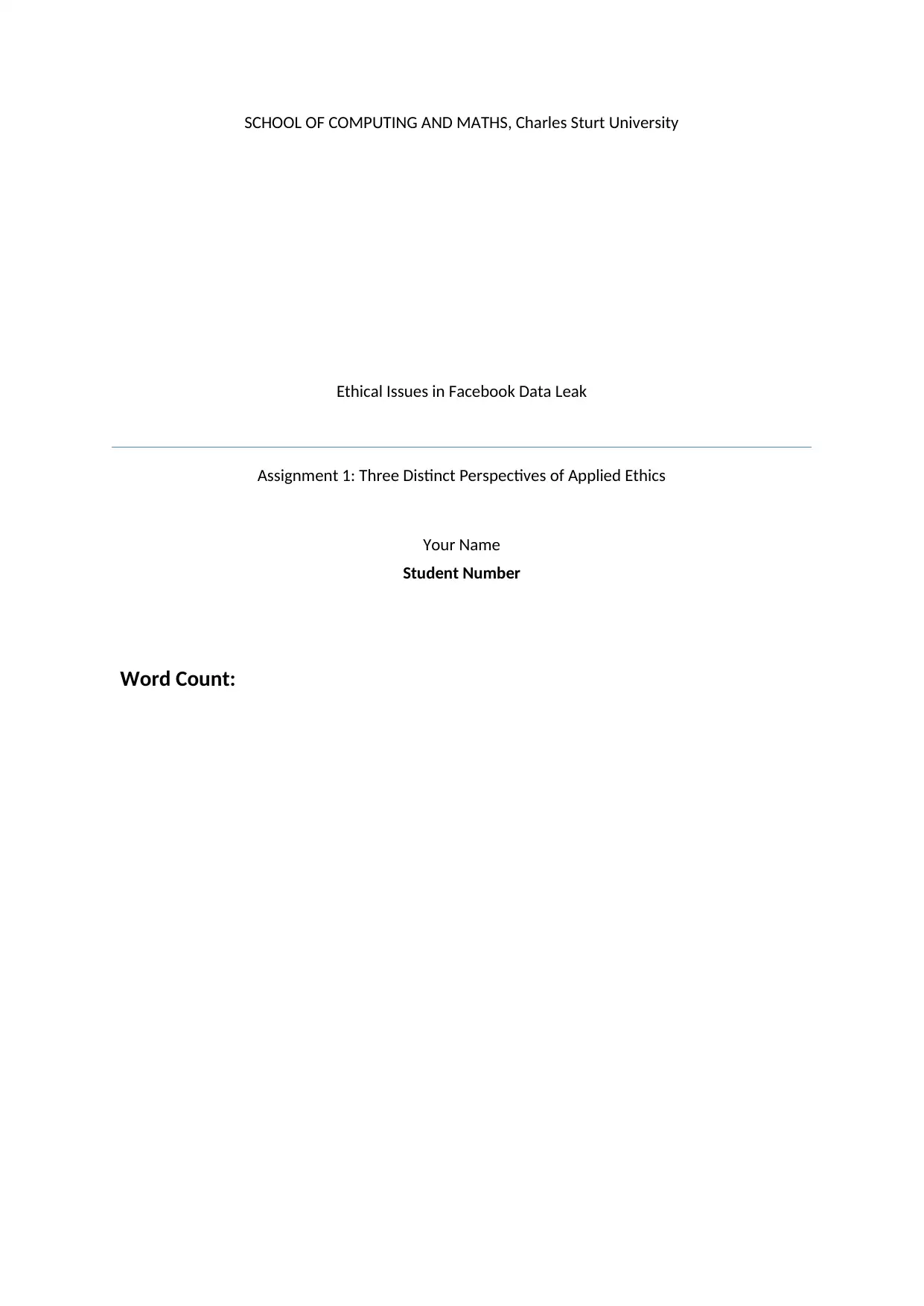
SCHOOL OF COMPUTING AND MATHS, Charles Sturt University
Ethical Issues in Facebook Data Leak
Assignment 1: Three Distinct Perspectives of Applied Ethics
Your Name
Student Number
Word Count:
Ethical Issues in Facebook Data Leak
Assignment 1: Three Distinct Perspectives of Applied Ethics
Your Name
Student Number
Word Count:
Paraphrase This Document
Need a fresh take? Get an instant paraphrase of this document with our AI Paraphraser
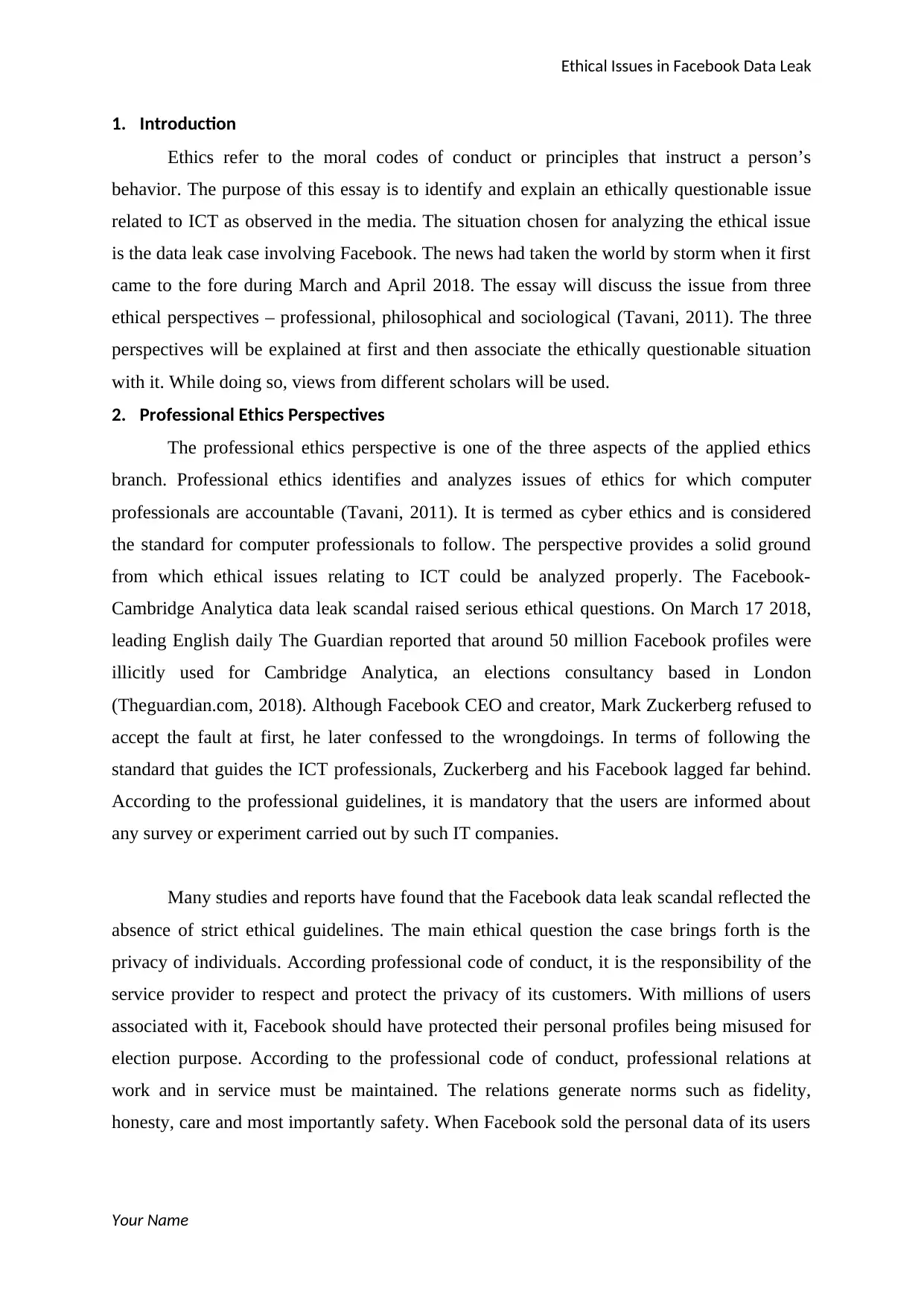
Ethical Issues in Facebook Data Leak
1. Introduction
Ethics refer to the moral codes of conduct or principles that instruct a person’s
behavior. The purpose of this essay is to identify and explain an ethically questionable issue
related to ICT as observed in the media. The situation chosen for analyzing the ethical issue
is the data leak case involving Facebook. The news had taken the world by storm when it first
came to the fore during March and April 2018. The essay will discuss the issue from three
ethical perspectives – professional, philosophical and sociological (Tavani, 2011). The three
perspectives will be explained at first and then associate the ethically questionable situation
with it. While doing so, views from different scholars will be used.
2. Professional Ethics Perspectives
The professional ethics perspective is one of the three aspects of the applied ethics
branch. Professional ethics identifies and analyzes issues of ethics for which computer
professionals are accountable (Tavani, 2011). It is termed as cyber ethics and is considered
the standard for computer professionals to follow. The perspective provides a solid ground
from which ethical issues relating to ICT could be analyzed properly. The Facebook-
Cambridge Analytica data leak scandal raised serious ethical questions. On March 17 2018,
leading English daily The Guardian reported that around 50 million Facebook profiles were
illicitly used for Cambridge Analytica, an elections consultancy based in London
(Theguardian.com, 2018). Although Facebook CEO and creator, Mark Zuckerberg refused to
accept the fault at first, he later confessed to the wrongdoings. In terms of following the
standard that guides the ICT professionals, Zuckerberg and his Facebook lagged far behind.
According to the professional guidelines, it is mandatory that the users are informed about
any survey or experiment carried out by such IT companies.
Many studies and reports have found that the Facebook data leak scandal reflected the
absence of strict ethical guidelines. The main ethical question the case brings forth is the
privacy of individuals. According professional code of conduct, it is the responsibility of the
service provider to respect and protect the privacy of its customers. With millions of users
associated with it, Facebook should have protected their personal profiles being misused for
election purpose. According to the professional code of conduct, professional relations at
work and in service must be maintained. The relations generate norms such as fidelity,
honesty, care and most importantly safety. When Facebook sold the personal data of its users
Your Name
1. Introduction
Ethics refer to the moral codes of conduct or principles that instruct a person’s
behavior. The purpose of this essay is to identify and explain an ethically questionable issue
related to ICT as observed in the media. The situation chosen for analyzing the ethical issue
is the data leak case involving Facebook. The news had taken the world by storm when it first
came to the fore during March and April 2018. The essay will discuss the issue from three
ethical perspectives – professional, philosophical and sociological (Tavani, 2011). The three
perspectives will be explained at first and then associate the ethically questionable situation
with it. While doing so, views from different scholars will be used.
2. Professional Ethics Perspectives
The professional ethics perspective is one of the three aspects of the applied ethics
branch. Professional ethics identifies and analyzes issues of ethics for which computer
professionals are accountable (Tavani, 2011). It is termed as cyber ethics and is considered
the standard for computer professionals to follow. The perspective provides a solid ground
from which ethical issues relating to ICT could be analyzed properly. The Facebook-
Cambridge Analytica data leak scandal raised serious ethical questions. On March 17 2018,
leading English daily The Guardian reported that around 50 million Facebook profiles were
illicitly used for Cambridge Analytica, an elections consultancy based in London
(Theguardian.com, 2018). Although Facebook CEO and creator, Mark Zuckerberg refused to
accept the fault at first, he later confessed to the wrongdoings. In terms of following the
standard that guides the ICT professionals, Zuckerberg and his Facebook lagged far behind.
According to the professional guidelines, it is mandatory that the users are informed about
any survey or experiment carried out by such IT companies.
Many studies and reports have found that the Facebook data leak scandal reflected the
absence of strict ethical guidelines. The main ethical question the case brings forth is the
privacy of individuals. According professional code of conduct, it is the responsibility of the
service provider to respect and protect the privacy of its customers. With millions of users
associated with it, Facebook should have protected their personal profiles being misused for
election purpose. According to the professional code of conduct, professional relations at
work and in service must be maintained. The relations generate norms such as fidelity,
honesty, care and most importantly safety. When Facebook sold the personal data of its users
Your Name
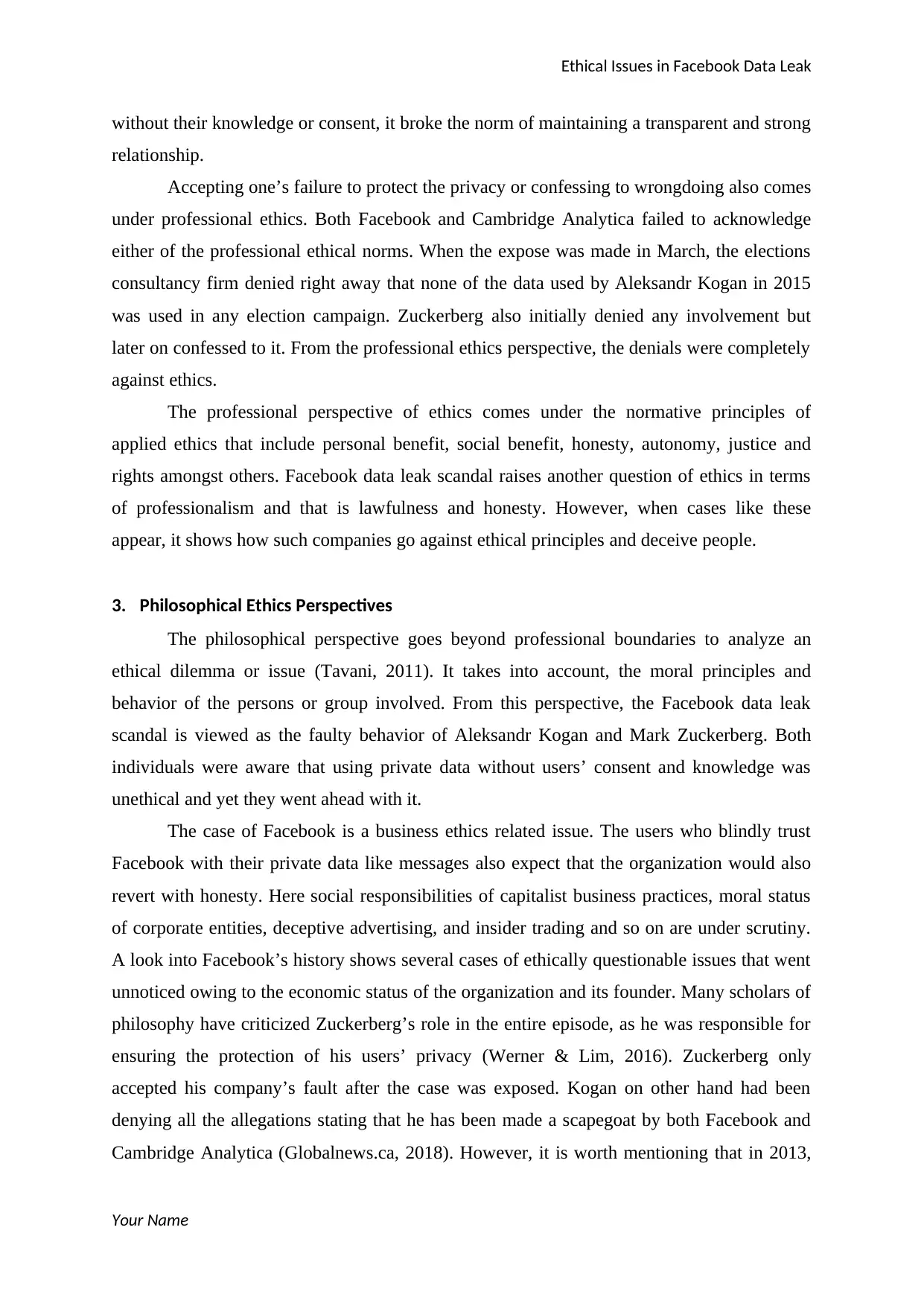
Ethical Issues in Facebook Data Leak
without their knowledge or consent, it broke the norm of maintaining a transparent and strong
relationship.
Accepting one’s failure to protect the privacy or confessing to wrongdoing also comes
under professional ethics. Both Facebook and Cambridge Analytica failed to acknowledge
either of the professional ethical norms. When the expose was made in March, the elections
consultancy firm denied right away that none of the data used by Aleksandr Kogan in 2015
was used in any election campaign. Zuckerberg also initially denied any involvement but
later on confessed to it. From the professional ethics perspective, the denials were completely
against ethics.
The professional perspective of ethics comes under the normative principles of
applied ethics that include personal benefit, social benefit, honesty, autonomy, justice and
rights amongst others. Facebook data leak scandal raises another question of ethics in terms
of professionalism and that is lawfulness and honesty. However, when cases like these
appear, it shows how such companies go against ethical principles and deceive people.
3. Philosophical Ethics Perspectives
The philosophical perspective goes beyond professional boundaries to analyze an
ethical dilemma or issue (Tavani, 2011). It takes into account, the moral principles and
behavior of the persons or group involved. From this perspective, the Facebook data leak
scandal is viewed as the faulty behavior of Aleksandr Kogan and Mark Zuckerberg. Both
individuals were aware that using private data without users’ consent and knowledge was
unethical and yet they went ahead with it.
The case of Facebook is a business ethics related issue. The users who blindly trust
Facebook with their private data like messages also expect that the organization would also
revert with honesty. Here social responsibilities of capitalist business practices, moral status
of corporate entities, deceptive advertising, and insider trading and so on are under scrutiny.
A look into Facebook’s history shows several cases of ethically questionable issues that went
unnoticed owing to the economic status of the organization and its founder. Many scholars of
philosophy have criticized Zuckerberg’s role in the entire episode, as he was responsible for
ensuring the protection of his users’ privacy (Werner & Lim, 2016). Zuckerberg only
accepted his company’s fault after the case was exposed. Kogan on other hand had been
denying all the allegations stating that he has been made a scapegoat by both Facebook and
Cambridge Analytica (Globalnews.ca, 2018). However, it is worth mentioning that in 2013,
Your Name
without their knowledge or consent, it broke the norm of maintaining a transparent and strong
relationship.
Accepting one’s failure to protect the privacy or confessing to wrongdoing also comes
under professional ethics. Both Facebook and Cambridge Analytica failed to acknowledge
either of the professional ethical norms. When the expose was made in March, the elections
consultancy firm denied right away that none of the data used by Aleksandr Kogan in 2015
was used in any election campaign. Zuckerberg also initially denied any involvement but
later on confessed to it. From the professional ethics perspective, the denials were completely
against ethics.
The professional perspective of ethics comes under the normative principles of
applied ethics that include personal benefit, social benefit, honesty, autonomy, justice and
rights amongst others. Facebook data leak scandal raises another question of ethics in terms
of professionalism and that is lawfulness and honesty. However, when cases like these
appear, it shows how such companies go against ethical principles and deceive people.
3. Philosophical Ethics Perspectives
The philosophical perspective goes beyond professional boundaries to analyze an
ethical dilemma or issue (Tavani, 2011). It takes into account, the moral principles and
behavior of the persons or group involved. From this perspective, the Facebook data leak
scandal is viewed as the faulty behavior of Aleksandr Kogan and Mark Zuckerberg. Both
individuals were aware that using private data without users’ consent and knowledge was
unethical and yet they went ahead with it.
The case of Facebook is a business ethics related issue. The users who blindly trust
Facebook with their private data like messages also expect that the organization would also
revert with honesty. Here social responsibilities of capitalist business practices, moral status
of corporate entities, deceptive advertising, and insider trading and so on are under scrutiny.
A look into Facebook’s history shows several cases of ethically questionable issues that went
unnoticed owing to the economic status of the organization and its founder. Many scholars of
philosophy have criticized Zuckerberg’s role in the entire episode, as he was responsible for
ensuring the protection of his users’ privacy (Werner & Lim, 2016). Zuckerberg only
accepted his company’s fault after the case was exposed. Kogan on other hand had been
denying all the allegations stating that he has been made a scapegoat by both Facebook and
Cambridge Analytica (Globalnews.ca, 2018). However, it is worth mentioning that in 2013,
Your Name
⊘ This is a preview!⊘
Do you want full access?
Subscribe today to unlock all pages.

Trusted by 1+ million students worldwide
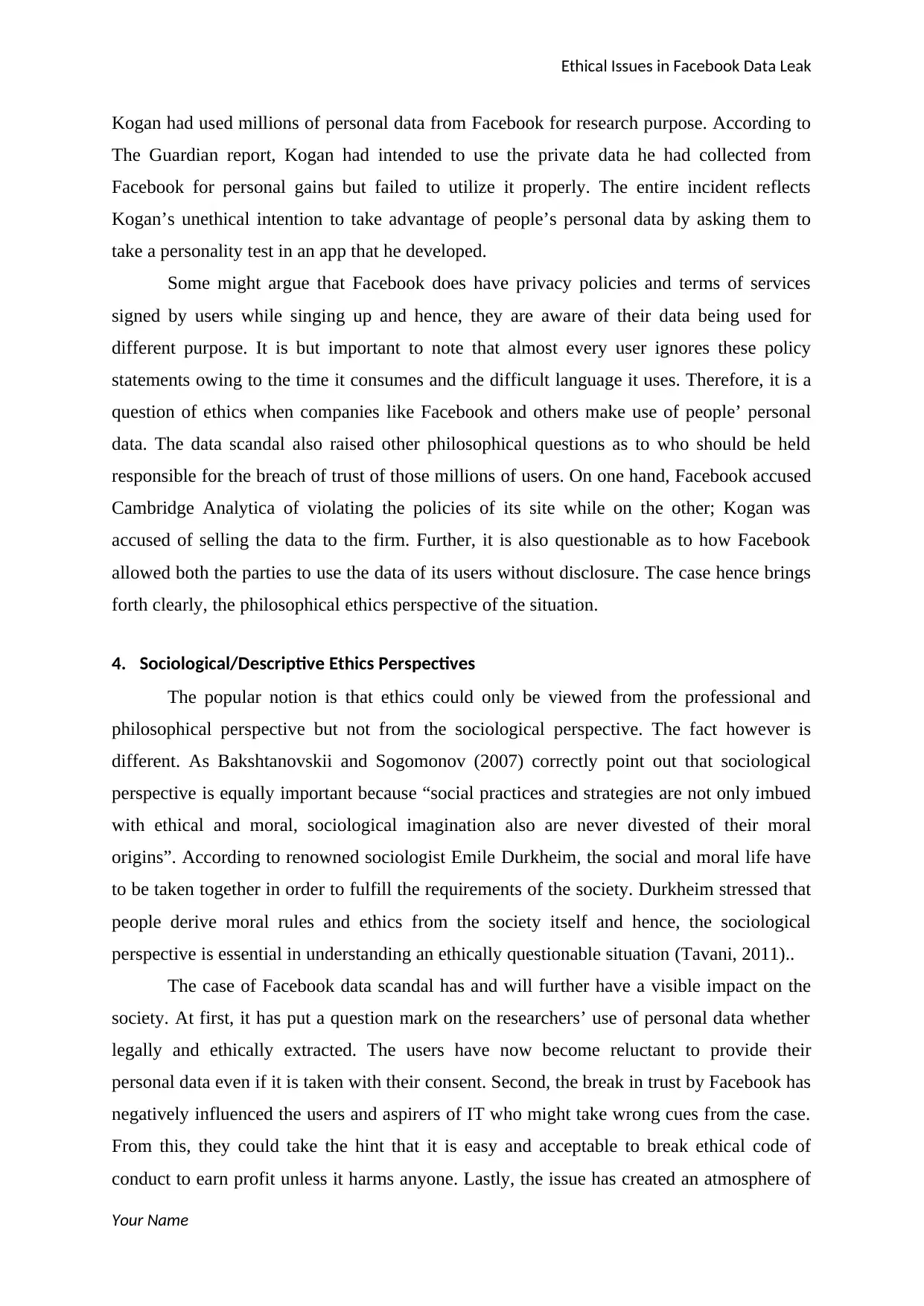
Ethical Issues in Facebook Data Leak
Kogan had used millions of personal data from Facebook for research purpose. According to
The Guardian report, Kogan had intended to use the private data he had collected from
Facebook for personal gains but failed to utilize it properly. The entire incident reflects
Kogan’s unethical intention to take advantage of people’s personal data by asking them to
take a personality test in an app that he developed.
Some might argue that Facebook does have privacy policies and terms of services
signed by users while singing up and hence, they are aware of their data being used for
different purpose. It is but important to note that almost every user ignores these policy
statements owing to the time it consumes and the difficult language it uses. Therefore, it is a
question of ethics when companies like Facebook and others make use of people’ personal
data. The data scandal also raised other philosophical questions as to who should be held
responsible for the breach of trust of those millions of users. On one hand, Facebook accused
Cambridge Analytica of violating the policies of its site while on the other; Kogan was
accused of selling the data to the firm. Further, it is also questionable as to how Facebook
allowed both the parties to use the data of its users without disclosure. The case hence brings
forth clearly, the philosophical ethics perspective of the situation.
4. Sociological/Descriptive Ethics Perspectives
The popular notion is that ethics could only be viewed from the professional and
philosophical perspective but not from the sociological perspective. The fact however is
different. As Bakshtanovskii and Sogomonov (2007) correctly point out that sociological
perspective is equally important because “social practices and strategies are not only imbued
with ethical and moral, sociological imagination also are never divested of their moral
origins”. According to renowned sociologist Emile Durkheim, the social and moral life have
to be taken together in order to fulfill the requirements of the society. Durkheim stressed that
people derive moral rules and ethics from the society itself and hence, the sociological
perspective is essential in understanding an ethically questionable situation (Tavani, 2011)..
The case of Facebook data scandal has and will further have a visible impact on the
society. At first, it has put a question mark on the researchers’ use of personal data whether
legally and ethically extracted. The users have now become reluctant to provide their
personal data even if it is taken with their consent. Second, the break in trust by Facebook has
negatively influenced the users and aspirers of IT who might take wrong cues from the case.
From this, they could take the hint that it is easy and acceptable to break ethical code of
conduct to earn profit unless it harms anyone. Lastly, the issue has created an atmosphere of
Your Name
Kogan had used millions of personal data from Facebook for research purpose. According to
The Guardian report, Kogan had intended to use the private data he had collected from
Facebook for personal gains but failed to utilize it properly. The entire incident reflects
Kogan’s unethical intention to take advantage of people’s personal data by asking them to
take a personality test in an app that he developed.
Some might argue that Facebook does have privacy policies and terms of services
signed by users while singing up and hence, they are aware of their data being used for
different purpose. It is but important to note that almost every user ignores these policy
statements owing to the time it consumes and the difficult language it uses. Therefore, it is a
question of ethics when companies like Facebook and others make use of people’ personal
data. The data scandal also raised other philosophical questions as to who should be held
responsible for the breach of trust of those millions of users. On one hand, Facebook accused
Cambridge Analytica of violating the policies of its site while on the other; Kogan was
accused of selling the data to the firm. Further, it is also questionable as to how Facebook
allowed both the parties to use the data of its users without disclosure. The case hence brings
forth clearly, the philosophical ethics perspective of the situation.
4. Sociological/Descriptive Ethics Perspectives
The popular notion is that ethics could only be viewed from the professional and
philosophical perspective but not from the sociological perspective. The fact however is
different. As Bakshtanovskii and Sogomonov (2007) correctly point out that sociological
perspective is equally important because “social practices and strategies are not only imbued
with ethical and moral, sociological imagination also are never divested of their moral
origins”. According to renowned sociologist Emile Durkheim, the social and moral life have
to be taken together in order to fulfill the requirements of the society. Durkheim stressed that
people derive moral rules and ethics from the society itself and hence, the sociological
perspective is essential in understanding an ethically questionable situation (Tavani, 2011)..
The case of Facebook data scandal has and will further have a visible impact on the
society. At first, it has put a question mark on the researchers’ use of personal data whether
legally and ethically extracted. The users have now become reluctant to provide their
personal data even if it is taken with their consent. Second, the break in trust by Facebook has
negatively influenced the users and aspirers of IT who might take wrong cues from the case.
From this, they could take the hint that it is easy and acceptable to break ethical code of
conduct to earn profit unless it harms anyone. Lastly, the issue has created an atmosphere of
Your Name
Paraphrase This Document
Need a fresh take? Get an instant paraphrase of this document with our AI Paraphraser
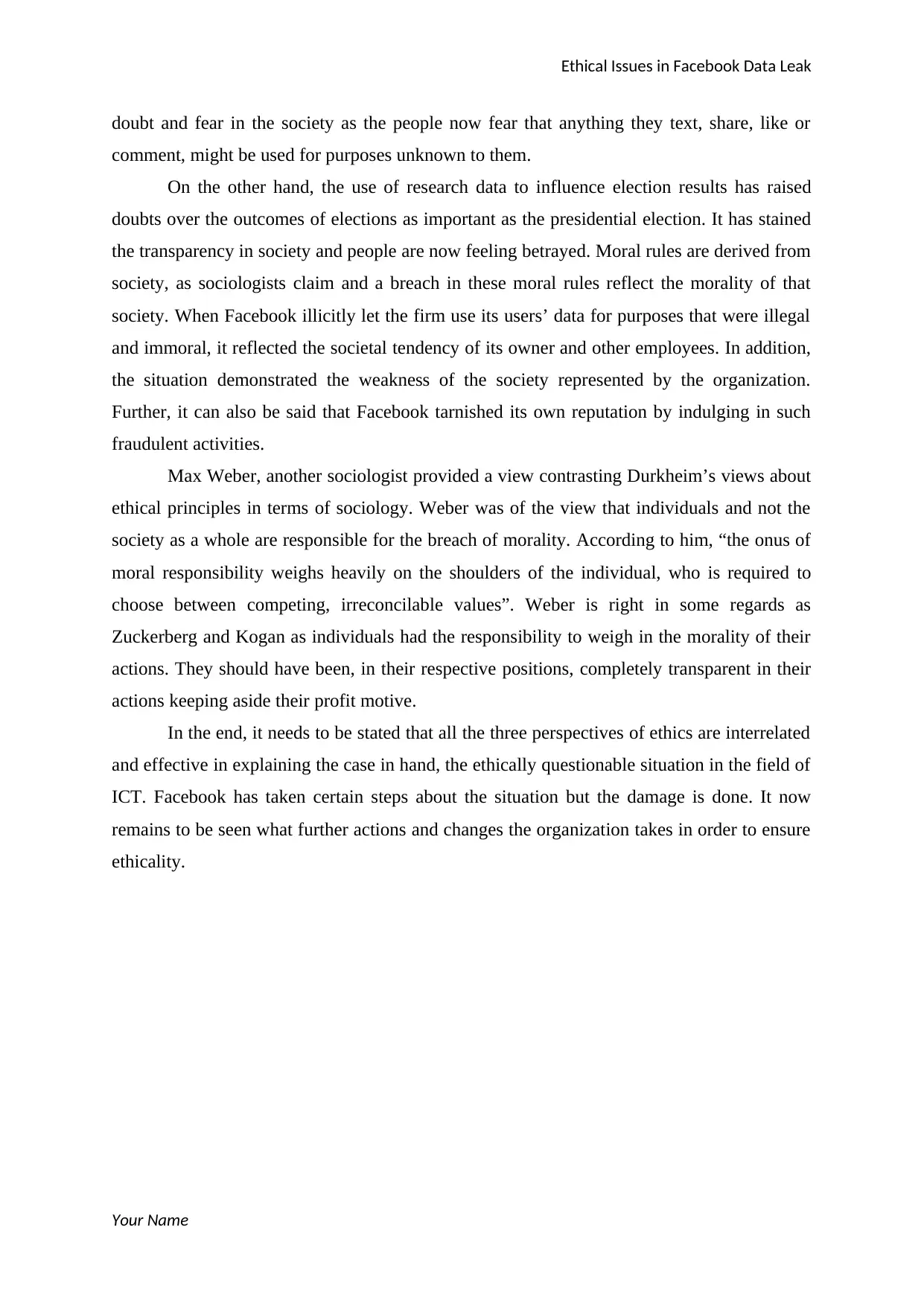
Ethical Issues in Facebook Data Leak
doubt and fear in the society as the people now fear that anything they text, share, like or
comment, might be used for purposes unknown to them.
On the other hand, the use of research data to influence election results has raised
doubts over the outcomes of elections as important as the presidential election. It has stained
the transparency in society and people are now feeling betrayed. Moral rules are derived from
society, as sociologists claim and a breach in these moral rules reflect the morality of that
society. When Facebook illicitly let the firm use its users’ data for purposes that were illegal
and immoral, it reflected the societal tendency of its owner and other employees. In addition,
the situation demonstrated the weakness of the society represented by the organization.
Further, it can also be said that Facebook tarnished its own reputation by indulging in such
fraudulent activities.
Max Weber, another sociologist provided a view contrasting Durkheim’s views about
ethical principles in terms of sociology. Weber was of the view that individuals and not the
society as a whole are responsible for the breach of morality. According to him, “the onus of
moral responsibility weighs heavily on the shoulders of the individual, who is required to
choose between competing, irreconcilable values”. Weber is right in some regards as
Zuckerberg and Kogan as individuals had the responsibility to weigh in the morality of their
actions. They should have been, in their respective positions, completely transparent in their
actions keeping aside their profit motive.
In the end, it needs to be stated that all the three perspectives of ethics are interrelated
and effective in explaining the case in hand, the ethically questionable situation in the field of
ICT. Facebook has taken certain steps about the situation but the damage is done. It now
remains to be seen what further actions and changes the organization takes in order to ensure
ethicality.
Your Name
doubt and fear in the society as the people now fear that anything they text, share, like or
comment, might be used for purposes unknown to them.
On the other hand, the use of research data to influence election results has raised
doubts over the outcomes of elections as important as the presidential election. It has stained
the transparency in society and people are now feeling betrayed. Moral rules are derived from
society, as sociologists claim and a breach in these moral rules reflect the morality of that
society. When Facebook illicitly let the firm use its users’ data for purposes that were illegal
and immoral, it reflected the societal tendency of its owner and other employees. In addition,
the situation demonstrated the weakness of the society represented by the organization.
Further, it can also be said that Facebook tarnished its own reputation by indulging in such
fraudulent activities.
Max Weber, another sociologist provided a view contrasting Durkheim’s views about
ethical principles in terms of sociology. Weber was of the view that individuals and not the
society as a whole are responsible for the breach of morality. According to him, “the onus of
moral responsibility weighs heavily on the shoulders of the individual, who is required to
choose between competing, irreconcilable values”. Weber is right in some regards as
Zuckerberg and Kogan as individuals had the responsibility to weigh in the morality of their
actions. They should have been, in their respective positions, completely transparent in their
actions keeping aside their profit motive.
In the end, it needs to be stated that all the three perspectives of ethics are interrelated
and effective in explaining the case in hand, the ethically questionable situation in the field of
ICT. Facebook has taken certain steps about the situation but the damage is done. It now
remains to be seen what further actions and changes the organization takes in order to ensure
ethicality.
Your Name
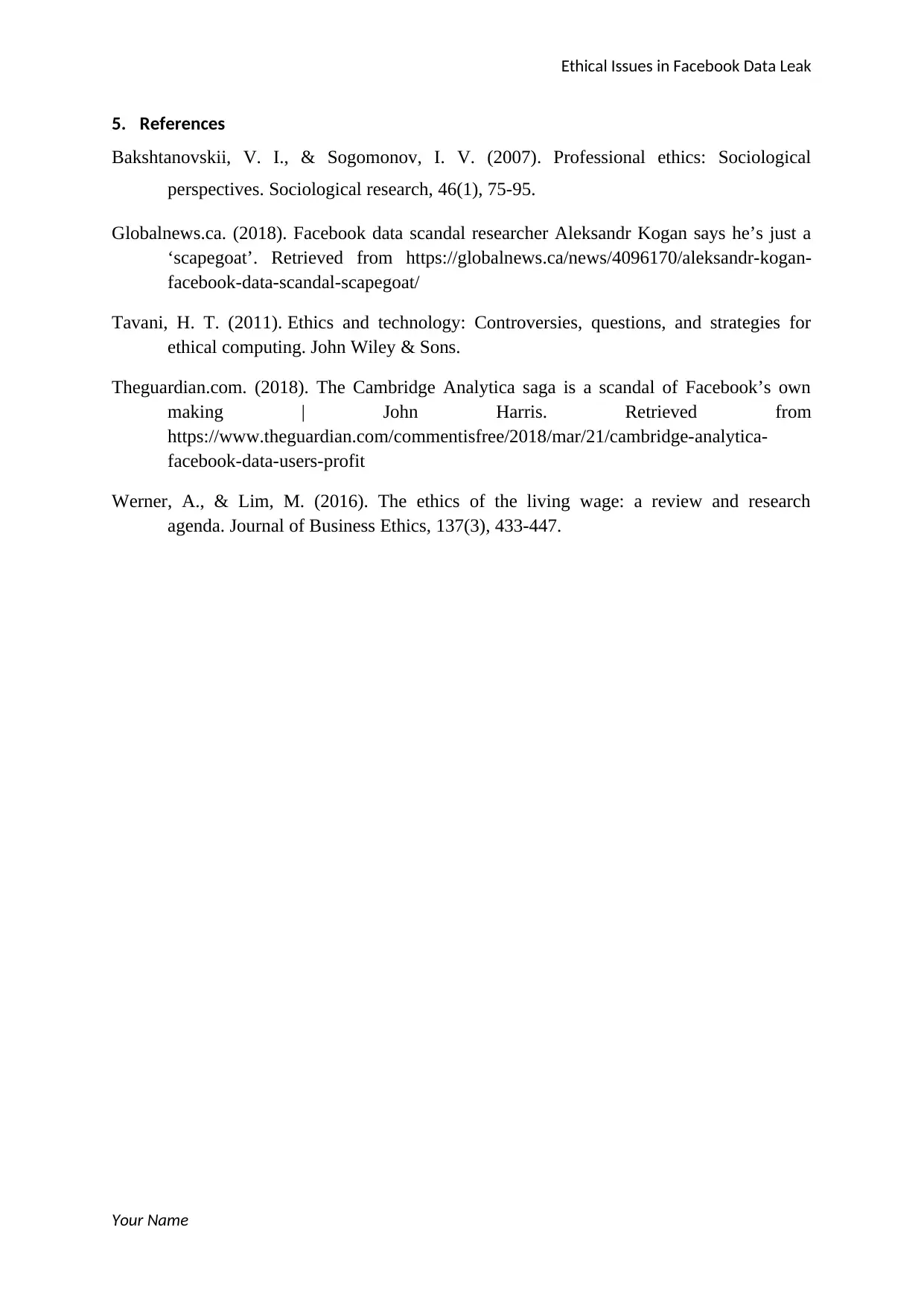
Ethical Issues in Facebook Data Leak
5. References
Bakshtanovskii, V. I., & Sogomonov, I. V. (2007). Professional ethics: Sociological
perspectives. Sociological research, 46(1), 75-95.
Globalnews.ca. (2018). Facebook data scandal researcher Aleksandr Kogan says he’s just a
‘scapegoat’. Retrieved from https://globalnews.ca/news/4096170/aleksandr-kogan-
facebook-data-scandal-scapegoat/
Tavani, H. T. (2011). Ethics and technology: Controversies, questions, and strategies for
ethical computing. John Wiley & Sons.
Theguardian.com. (2018). The Cambridge Analytica saga is a scandal of Facebook’s own
making | John Harris. Retrieved from
https://www.theguardian.com/commentisfree/2018/mar/21/cambridge-analytica-
facebook-data-users-profit
Werner, A., & Lim, M. (2016). The ethics of the living wage: a review and research
agenda. Journal of Business Ethics, 137(3), 433-447.
Your Name
5. References
Bakshtanovskii, V. I., & Sogomonov, I. V. (2007). Professional ethics: Sociological
perspectives. Sociological research, 46(1), 75-95.
Globalnews.ca. (2018). Facebook data scandal researcher Aleksandr Kogan says he’s just a
‘scapegoat’. Retrieved from https://globalnews.ca/news/4096170/aleksandr-kogan-
facebook-data-scandal-scapegoat/
Tavani, H. T. (2011). Ethics and technology: Controversies, questions, and strategies for
ethical computing. John Wiley & Sons.
Theguardian.com. (2018). The Cambridge Analytica saga is a scandal of Facebook’s own
making | John Harris. Retrieved from
https://www.theguardian.com/commentisfree/2018/mar/21/cambridge-analytica-
facebook-data-users-profit
Werner, A., & Lim, M. (2016). The ethics of the living wage: a review and research
agenda. Journal of Business Ethics, 137(3), 433-447.
Your Name
⊘ This is a preview!⊘
Do you want full access?
Subscribe today to unlock all pages.

Trusted by 1+ million students worldwide
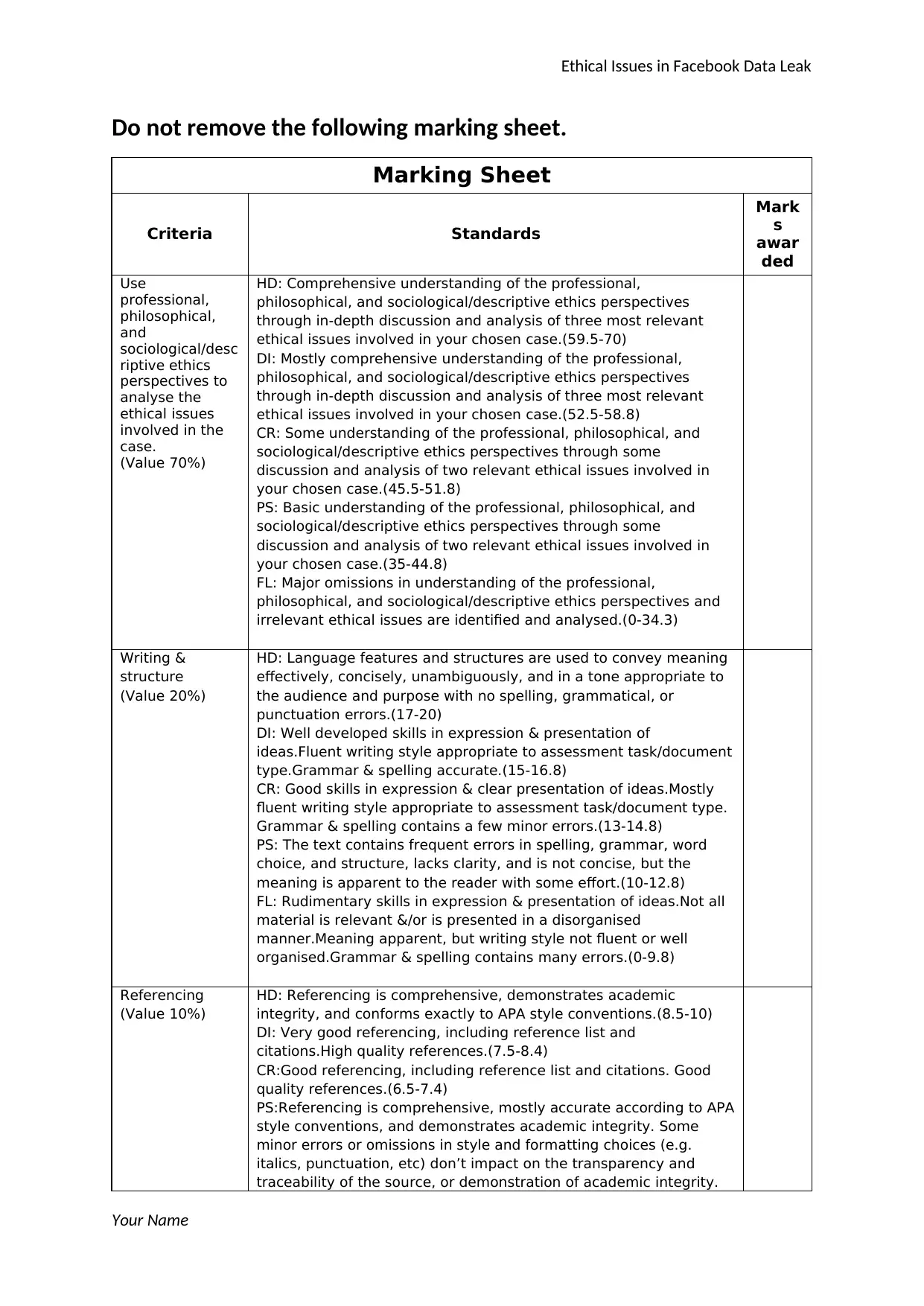
Ethical Issues in Facebook Data Leak
Do not remove the following marking sheet.
Marking Sheet
Criteria Standards
Mark
s
awar
ded
Use
professional,
philosophical,
and
sociological/desc
riptive ethics
perspectives to
analyse the
ethical issues
involved in the
case.
(Value 70%)
HD: Comprehensive understanding of the professional,
philosophical, and sociological/descriptive ethics perspectives
through in-depth discussion and analysis of three most relevant
ethical issues involved in your chosen case.(59.5-70)
DI: Mostly comprehensive understanding of the professional,
philosophical, and sociological/descriptive ethics perspectives
through in-depth discussion and analysis of three most relevant
ethical issues involved in your chosen case.(52.5-58.8)
CR: Some understanding of the professional, philosophical, and
sociological/descriptive ethics perspectives through some
discussion and analysis of two relevant ethical issues involved in
your chosen case.(45.5-51.8)
PS: Basic understanding of the professional, philosophical, and
sociological/descriptive ethics perspectives through some
discussion and analysis of two relevant ethical issues involved in
your chosen case.(35-44.8)
FL: Major omissions in understanding of the professional,
philosophical, and sociological/descriptive ethics perspectives and
irrelevant ethical issues are identified and analysed.(0-34.3)
Writing &
structure
(Value 20%)
HD: Language features and structures are used to convey meaning
effectively, concisely, unambiguously, and in a tone appropriate to
the audience and purpose with no spelling, grammatical, or
punctuation errors.(17-20)
DI: Well developed skills in expression & presentation of
ideas.Fluent writing style appropriate to assessment task/document
type.Grammar & spelling accurate.(15-16.8)
CR: Good skills in expression & clear presentation of ideas.Mostly
fluent writing style appropriate to assessment task/document type.
Grammar & spelling contains a few minor errors.(13-14.8)
PS: The text contains frequent errors in spelling, grammar, word
choice, and structure, lacks clarity, and is not concise, but the
meaning is apparent to the reader with some effort.(10-12.8)
FL: Rudimentary skills in expression & presentation of ideas.Not all
material is relevant &/or is presented in a disorganised
manner.Meaning apparent, but writing style not fluent or well
organised.Grammar & spelling contains many errors.(0-9.8)
Referencing
(Value 10%)
HD: Referencing is comprehensive, demonstrates academic
integrity, and conforms exactly to APA style conventions.(8.5-10)
DI: Very good referencing, including reference list and
citations.High quality references.(7.5-8.4)
CR:Good referencing, including reference list and citations. Good
quality references.(6.5-7.4)
PS:Referencing is comprehensive, mostly accurate according to APA
style conventions, and demonstrates academic integrity. Some
minor errors or omissions in style and formatting choices (e.g.
italics, punctuation, etc) don’t impact on the transparency and
traceability of the source, or demonstration of academic integrity.
Your Name
Do not remove the following marking sheet.
Marking Sheet
Criteria Standards
Mark
s
awar
ded
Use
professional,
philosophical,
and
sociological/desc
riptive ethics
perspectives to
analyse the
ethical issues
involved in the
case.
(Value 70%)
HD: Comprehensive understanding of the professional,
philosophical, and sociological/descriptive ethics perspectives
through in-depth discussion and analysis of three most relevant
ethical issues involved in your chosen case.(59.5-70)
DI: Mostly comprehensive understanding of the professional,
philosophical, and sociological/descriptive ethics perspectives
through in-depth discussion and analysis of three most relevant
ethical issues involved in your chosen case.(52.5-58.8)
CR: Some understanding of the professional, philosophical, and
sociological/descriptive ethics perspectives through some
discussion and analysis of two relevant ethical issues involved in
your chosen case.(45.5-51.8)
PS: Basic understanding of the professional, philosophical, and
sociological/descriptive ethics perspectives through some
discussion and analysis of two relevant ethical issues involved in
your chosen case.(35-44.8)
FL: Major omissions in understanding of the professional,
philosophical, and sociological/descriptive ethics perspectives and
irrelevant ethical issues are identified and analysed.(0-34.3)
Writing &
structure
(Value 20%)
HD: Language features and structures are used to convey meaning
effectively, concisely, unambiguously, and in a tone appropriate to
the audience and purpose with no spelling, grammatical, or
punctuation errors.(17-20)
DI: Well developed skills in expression & presentation of
ideas.Fluent writing style appropriate to assessment task/document
type.Grammar & spelling accurate.(15-16.8)
CR: Good skills in expression & clear presentation of ideas.Mostly
fluent writing style appropriate to assessment task/document type.
Grammar & spelling contains a few minor errors.(13-14.8)
PS: The text contains frequent errors in spelling, grammar, word
choice, and structure, lacks clarity, and is not concise, but the
meaning is apparent to the reader with some effort.(10-12.8)
FL: Rudimentary skills in expression & presentation of ideas.Not all
material is relevant &/or is presented in a disorganised
manner.Meaning apparent, but writing style not fluent or well
organised.Grammar & spelling contains many errors.(0-9.8)
Referencing
(Value 10%)
HD: Referencing is comprehensive, demonstrates academic
integrity, and conforms exactly to APA style conventions.(8.5-10)
DI: Very good referencing, including reference list and
citations.High quality references.(7.5-8.4)
CR:Good referencing, including reference list and citations. Good
quality references.(6.5-7.4)
PS:Referencing is comprehensive, mostly accurate according to APA
style conventions, and demonstrates academic integrity. Some
minor errors or omissions in style and formatting choices (e.g.
italics, punctuation, etc) don’t impact on the transparency and
traceability of the source, or demonstration of academic integrity.
Your Name
Paraphrase This Document
Need a fresh take? Get an instant paraphrase of this document with our AI Paraphraser
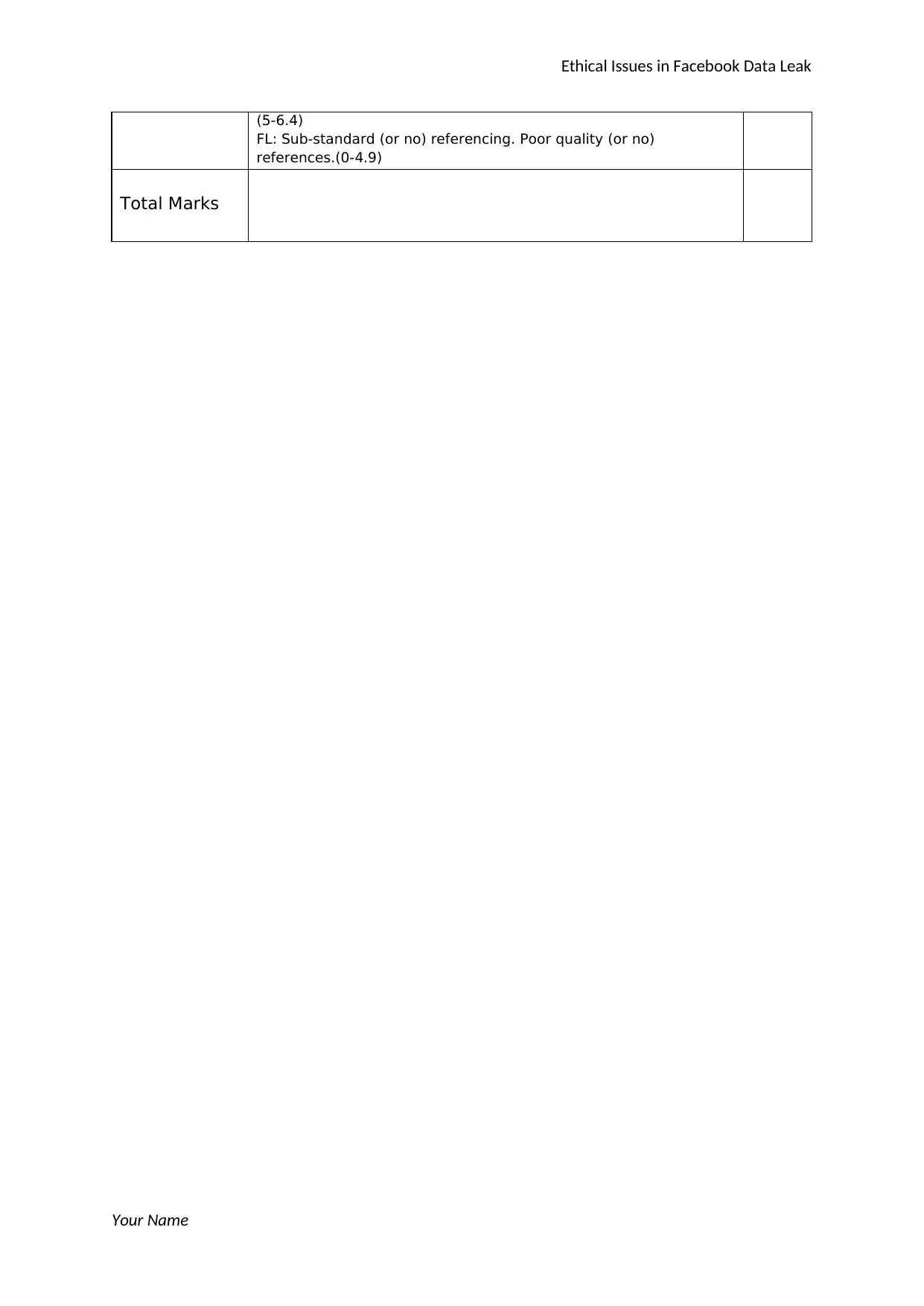
Ethical Issues in Facebook Data Leak
(5-6.4)
FL: Sub-standard (or no) referencing. Poor quality (or no)
references.(0-4.9)
Total Marks
Your Name
(5-6.4)
FL: Sub-standard (or no) referencing. Poor quality (or no)
references.(0-4.9)
Total Marks
Your Name
1 out of 8
Related Documents
Your All-in-One AI-Powered Toolkit for Academic Success.
+13062052269
info@desklib.com
Available 24*7 on WhatsApp / Email
![[object Object]](/_next/static/media/star-bottom.7253800d.svg)
Unlock your academic potential
Copyright © 2020–2026 A2Z Services. All Rights Reserved. Developed and managed by ZUCOL.





